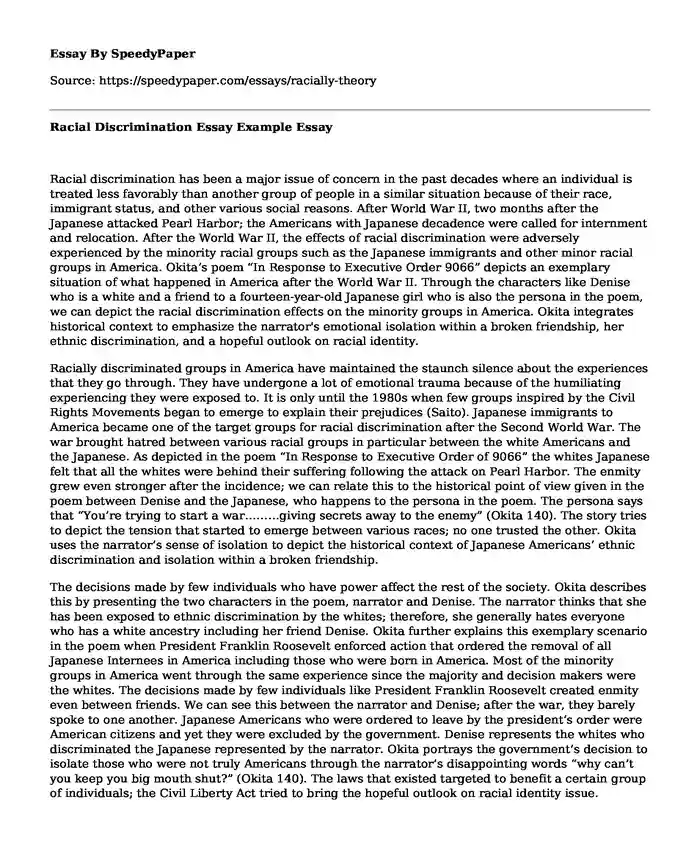
| Type of paper: | Essay |
| Categories: | Racism Discrimination |
| Pages: | 4 |
| Wordcount: | 936 words |
Racial discrimination has been a major issue of concern in the past decades where an individual is treated less favorably than another group of people in a similar situation because of their race, immigrant status, and other various social reasons. After World War II, two months after the Japanese attacked Pearl Harbor; the Americans with Japanese decadence were called for internment and relocation. After the World War II, the effects of racial discrimination were adversely experienced by the minority racial groups such as the Japanese immigrants and other minor racial groups in America. Okita’s poem “In Response to Executive Order 9066” depicts an exemplary situation of what happened in America after the World War II. Through the characters like Denise who is a white and a friend to a fourteen-year-old Japanese girl who is also the persona in the poem, we can depict the racial discrimination effects on the minority groups in America. Okita integrates historical context to emphasize the narrator's emotional isolation within a broken friendship, her ethnic discrimination, and a hopeful outlook on racial identity.
Racially discriminated groups in America have maintained the staunch silence about the experiences that they go through. They have undergone a lot of emotional trauma because of the humiliating experiencing they were exposed to. It is only until the 1980s when few groups inspired by the Civil Rights Movements began to emerge to explain their prejudices (Saito). Japanese immigrants to America became one of the target groups for racial discrimination after the Second World War. The war brought hatred between various racial groups in particular between the white Americans and the Japanese. As depicted in the poem “In Response to Executive Order of 9066” the whites Japanese felt that all the whites were behind their suffering following the attack on Pearl Harbor. The enmity grew even stronger after the incidence; we can relate this to the historical point of view given in the poem between Denise and the Japanese, who happens to the persona in the poem. The persona says that “You’re trying to start a war………giving secrets away to the enemy” (Okita 140). The story tries to depict the tension that started to emerge between various races; no one trusted the other. Okita uses the narrator’s sense of isolation to depict the historical context of Japanese Americans’ ethnic discrimination and isolation within a broken friendship.
The decisions made by few individuals who have power affect the rest of the society. Okita describes this by presenting the two characters in the poem, narrator and Denise. The narrator thinks that she has been exposed to ethnic discrimination by the whites; therefore, she generally hates everyone who has a white ancestry including her friend Denise. Okita further explains this exemplary scenario in the poem when President Franklin Roosevelt enforced action that ordered the removal of all Japanese Internees in America including those who were born in America. Most of the minority groups in America went through the same experience since the majority and decision makers were the whites. The decisions made by few individuals like President Franklin Roosevelt created enmity even between friends. We can see this between the narrator and Denise; after the war, they barely spoke to one another. Japanese Americans who were ordered to leave by the president’s order were American citizens and yet they were excluded by the government. Denise represents the whites who discriminated the Japanese represented by the narrator. Okita portrays the government’s decision to isolate those who were not truly Americans through the narrator’s disappointing words “why can’t you keep you big mouth shut?” (Okita 140). The laws that existed targeted to benefit a certain group of individuals; the Civil Liberty Act tried to bring the hopeful outlook on racial identity issue.
Lee et al. explain that categorization based on one’s color, racial background, religion or any other social factor can cause emotional reactions of the victims (791). The Japanese Americans experienced all sorts of injustices and violation of human rights for a long time. Okita relates this historical context with the poem where Denise and the narrator no longer consider one another friends; they see one another as enemies. Saito explains that most of the Japanese internees lost their properties and never received compensation even though there was Civil Liberty Act that advocated for such cases. The humiliation that they were exposed to was traumatizing; enmity emerged between friends as a result of the humiliation and injustices. The narrator in the poem tries not to identify herself with Denise because she regards him as a traitor for having exposed her to ethnic discrimination. Okita explains this by presenting the narrator’s emotional isolation within the broken friendship; the social privileges were no longer enjoyed by everyone as it used to be.
Works Cited
Lee, Sun Young, Marko Pitesa, Stefan Thau, and Madan M. Pillutla. "Discrimination in selection decisions: Integrating stereotype fit and interdependence theories." Academy of Management Journal 58, no. 3 (2015): 789-812. Accessed on 8th November, 2016 from http://eds.a.ebscohost.com.ezp.raritanval.edu/eds/pdfviewer/pdfviewer?sid=f7bb33d6-d4a8-46bd-af8f-188d5c789c2f%40sessionmgr4006&vid=0&hid=4108
Saito, Natsu Taylor. "At the Heart of the Law: Remedies for Massive Wrongs." Rev. Litig. 27 (2007): 281.Accesed on 8th November, 2016 from http://eds.a.ebscohost.com.ezp.raritanval.edu/eds/pdfviewer/pdfviewer?sid=d0c6802e-cfb3-4e63-9712-66a3b7e50ae1%40sessionmgr4006&vid=0&hid=4108
Cite this page
Racial Discrimination Essay Example. (2017, Dec 20). Retrieved from https://speedypaper.net/essays/racially-theory
Request Removal
If you are the original author of this essay and no longer wish to have it published on the SpeedyPaper website, please click below to request its removal:
- Impacts of Personality Traits on Socialization, Essay Example
- Essay Sample about Great Educational Background
- Heroism Definition Essay Example
- Free Essay: A Case Study on Integrating ESL Students into the Mainstream Curriculum
- Free Essay Sample on Democracy and Oligarchy
- Career Essay Sample: Resume Skills and Summary
- Free Essay on Cultural Diversity Consciousness in the School Setting
Popular categories




